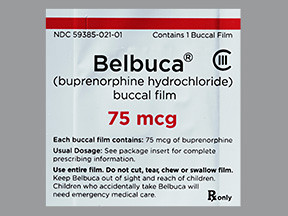BUPRENORPHINE FILM - BUCCAL
PHONETIC PRONUNCIATION: (BUE-pre-NOR-feen)
COMMON BRAND NAME(S): Belbuca
GENERIC NAME(S): buprenorphine HCl
Uses
USES: Buprenorphine is used to help relieve severe ongoing pain. Buprenorphine belongs to a class of drugs known as opioid (narcotic) analgesics. It works in the brain to change how your body feels and responds to pain. Do not use this medication to relieve pain that is mild or that will go away in a few days. This medication is not for occasional ("as needed") use.
How to use BUPRENORPHINE FILM - BUCCAL
HOW TO USE: See also Warning section. Read the Medication Guide provided by your pharmacist before you start using buprenorphine and each time you get a refill. Follow the illustrated directions for the proper use of this medication. If you have any questions, ask your doctor or pharmacist. Use this medication on a regular schedule as directed by your doctor, not as needed for sudden (breakthrough) pain. Use this medication in the mouth as directed by your doctor, usually every 12 hours. To reduce your risk of side effects, your doctor may direct you to use this medication every 24 hours when you start this medication and gradually increase to every 12 hours. Follow your doctor's instructions carefully. Before using, rinse your mouth with water or use your tongue to wet the inside of your cheek. Use the tip of a dry finger to place one film inside your mouth with the yellow side facing against one cheek. Press and hold the film in place for 5 seconds, then remove your finger. The film should stay in place on its own after this. Leave it in place until it is dissolved. Do not move the film with your tongue/finger or drink or eat food until the film has completely dissolved. If your doctor directs you to use more than one film at the same time, do not place one on top of the other. Place one film on each side of your mouth. Do not place the film over open sores or lesions on the inside your cheek. Do not use the film if it is cut, damaged, or changed in any way. The dosage is based on your medical condition and response to treatment. Do not increase your dose or use this drug more often or for longer than prescribed, because your risk of side effects may increase. Properly stop the medication when so directed. Pain medications work best if they are used as the first signs of pain occur. If you wait until the pain has worsened, the medication may not work as well. Before you start using this medication, ask your doctor or pharmacist if you should stop or change how you use your other opioid medication(s). Other pain relievers (such as acetaminophen, ibuprofen) may also be prescribed. Ask your doctor or pharmacist about using buprenorphine safely with other drugs. If you suddenly stop using this medication, you may have withdrawal symptoms (such as restlessness, watering eyes, runny nose, nausea, sweating, muscle aches). To help prevent withdrawal, your doctor may lower your dose slowly. Withdrawal is more likely if you have used buprenorphine for a long time or in high doses. Tell your doctor or pharmacist right away if you have withdrawal. When this medication is used for a long time, it may not work as well. Talk with your doctor if this medication stops working well. Though it helps many people, this medication may sometimes cause addiction. This risk may be higher if you have a substance use disorder (such as overuse of or addiction to drugs/alcohol). Use this medication exactly as prescribed to lower the risk of addiction. Ask your doctor or pharmacist for more details. Tell your doctor if your pain lasts or gets worse.
Side Effects
Precautions
Interactions
Overdose
Images
Reviews
Faq for BUPRENORPHINE FILM - BUCCAL
Buprenorphine Film - Buccal is a medication that is used to treat opioid addiction. It contains the active ingredient buprenorphine, which helps to reduce withdrawal symptoms and cravings for opioids.
Buprenorphine Film - Buccal is placed on the inside of the cheek and allowed to dissolve. It should not be chewed or swallowed. The dosage and frequency of use will be determined by your healthcare provider.
The most common side effects of Buprenorphine Film - Buccal include headache, nausea, vomiting, constipation, and sweating. These side effects usually subside as your body adjusts to the medication.
Buprenorphine Film - Buccal can be addictive, but when used as prescribed, it helps to prevent the use of other opioids and aids in recovery from opioid addiction. It is essential to follow your healthcare provider's instructions closely to minimize the risk of addiction.
It is important to inform your healthcare provider about all the medications you are taking, including prescription and over-the-counter drugs, as well as any herbal supplements. Some medications may interact with Buprenorphine Film - Buccal, so your healthcare provider can advise you on the best course of action.
The duration that Buprenorphine Film - Buccal stays in your system can vary depending on various factors such as dosage, frequency of use, and individual metabolic rate. However, it typically remains detectable in urine for about 2-4 days after the last dose.
It is not recommended to stop taking Buprenorphine Film - Buccal suddenly without consulting your healthcare provider. They will help you develop a tapering plan to gradually reduce the dosage and minimize withdrawal symptoms.
Buprenorphine Film - Buccal may be used during pregnancy under the supervision of a healthcare provider. It is important to discuss the potential risks and benefits with your doctor, as untreated opioid addiction can also pose risks to the mother and the baby.
It is generally advised to avoid drinking alcohol while taking Buprenorphine Film - Buccal. Alcohol can increase the sedative effects of the medication and may also worsen certain side effects.
Warning
WARNING: Buprenorphine has a risk for abuse and addiction, which can lead to overdose and death. Buprenorphine may also cause severe, possibly fatal, breathing problems. To lower your risk, your doctor should have you use the smallest dose of buprenorphine that works, and use it for the shortest possible time. See also How to Use section for more information about addiction. The risk for severe breathing problems is higher when you start this medication and after a dose increase, or if you use the wrong dose/strength. Using this medication with alcohol or other drugs that can cause drowsiness or breathing problems may cause very serious side effects, including death. Be sure you know how to use buprenorphine and what other drugs you should avoid taking with it. See also Drug Interactions section. Get medical help right away if any of these very serious side effects occur: slow/shallow breathing, unusual lightheadedness, severe drowsiness/dizziness, difficulty waking up. Do not chew or swallow the film. Also, do not inject the medication in the film. Chewing or swallowing the film or injecting the buprenorphine in the film may cause a fatal overdose. Keep this medicine in a safe place to prevent theft, misuse, or abuse. If someone accidentally swallows or uses this drug, get medical help right away. Before using this medication, women of childbearing age should talk with their doctor(s) about the risks and benefits. Tell your doctor if you are pregnant or if you plan to become pregnant. During pregnancy, this medication should be used only when clearly needed. It may slightly increase the risk of birth defects if used during the first two months of pregnancy. Also, using it for a long time or in high doses near the expected delivery date may harm the unborn baby. To lessen the risk, use the smallest effective dose for the shortest possible time. Babies born to mothers who use this drug for a long time may develop severe (possibly fatal) withdrawal symptoms. Tell the doctor right away if you notice any symptoms in your newborn baby such as crying that doesn't stop, slow/shallow breathing, irritability, shaking, vomiting, diarrhea, poor feeding, or difficulty gaining weight.
Disclaimer
IMPORTANT: HOW TO USE THIS INFORMATION: This is a summary and does NOT have all possible information about this product. This information does not assure that this product is safe, effective, or appropriate for you. This information is not individual medical advice and does not substitute for the advice of your health care professional. Always ask your health care professional for complete information about this product and your specific health needs.



No Reviews Yet